All over the world this past weekend, protesters rallied against
genetically modified food - and in particular, against seed giant
Monsanto.
Dominic Titus, 30, saw the call for global protests against Monsanto's
practices on a social network: "It all started on Facebook," he
remembers. Titus had experience in organizing demonstrations, so he
agreed to help organize the protest against Monsanto in Munich. Some 300
people in the Bavarian capital joined the global "March against
Monsanto."
"US activists came up with the idea," Titus told DW, but in the end it was a miscellaneous bunch of people who ended up joining in - news reports said there were tens of thousands in hundreds of cities. Exact numbers are hard to come by - the activists said that more than two million protesters marched across the globe on Saturday. In the US, Argentina, the Netherlands, Australia and many other countries they carried banners saying "Monsanto kills" and "Save biodiversity."
Sweeping accusations
Demonstrators accuse the company of trying to establish a monopoly on food with its genetically modified seeds, which force farmers into dependency. To that end, they say, the company has close ties to politics and science. It tries to take out patents on life itself, they say, and endangers consumer health; in the end, it doesn't act in the interest of the people.
"Genetic engineering is safe," counters Ursula Lüttmer of Monsanto Germany, pointing to numerous studies to that effect. The people who demonstrated over the weekend did not have all the information needed to form a big picture, they only "listen selectively," Lüttmer told DW. Monsanto focuses on sustainable agriculture that is able to increase production, preserve resources and improve living standards, and she denies that there's any evidence of disadvantages for humans, animals or the environment from the use of Monsanto's genetically modified organisms or GMOs. "A certain mainstream opinion has been set in motion," Lüttmer argues. "We are forced to explain over and over again how much progress the technology has made."
Greenpeace Germany welcomed the protests - but did not participate. It was too much of a "broadside" without a clear focus, says Stephanie Töwe, Greenpeace's expert on genetic engineering. Titus accepts the criticism, and says protesters did not want to confine the demonstration to the one company: "'March against Monsanto' was only the global slogan," he says. In Munich they included other international concerns including Bayer, BASF, KWS and Syngenta. They wanted to be sure that the other companies would not let Monsanto take the attacks, while they continued with their projects undisturbed.
Influential global corporation
Monsanto stands for genetically engineered food like no other corporation. Worldwide, the US-based company is considered the largest trader in genetically modified seeds. Monsanto buys up other seed companies, growing constantly into what critics already label a virtual monopoly. Founded more than 100 years ago, Monsanto has branch offices in more than 60 countries. For some time, it's been focusing on agriculture, selling seeds and the accompanying herbicides.
Just a few years ago, Monsanto was almost unknown, Töwe says. But then protests cropped up everywhere, including in the US, where the company is based. "Today, the name has almost become an insult. Farmers, beekeepers, churches and other organizations are keeping a close eye on the corporation."
Planting genetically engineered plants - even for tests - is prohibited in Germany. Only two products - Monsanto's MON 810 corn and the Amflora potato of the German company BASF - are licensed to be grown in Europe. There's not much acreage under GMO crops, at least compared to North and South America.
Protecting profits
At first, many US farmers were thrilled by the economic success Monsanto promised. The genetically engineered plants and matching chemicals ensured large harvests with little effort. The drawback was that every year, the farmers were forced to buy seeds to grow the next crop - Monsanto regards replicating the seeds as infringing on its patent. Another drawback, Töwe says, is a massive increase in resistance: pests and weeds are on the rise, making new pesticides necessary.
Töwe notes the use of pesticides has surged over the past years in the US, as well as in Argentina and Brazil, where genetically modified soy and corn are grown. As a result, the seed company is designing new genetically engineered plants that can withstand even larger amounts of chemicals, in what Töwe describes as a perverted" cycle. "Plants like that need to be tested on animals like drugs," Töwe warns. "There are enough plants which have already been bred that do not need that kind of testing."
"US activists came up with the idea," Titus told DW, but in the end it was a miscellaneous bunch of people who ended up joining in - news reports said there were tens of thousands in hundreds of cities. Exact numbers are hard to come by - the activists said that more than two million protesters marched across the globe on Saturday. In the US, Argentina, the Netherlands, Australia and many other countries they carried banners saying "Monsanto kills" and "Save biodiversity."
Sweeping accusations
Demonstrators accuse the company of trying to establish a monopoly on food with its genetically modified seeds, which force farmers into dependency. To that end, they say, the company has close ties to politics and science. It tries to take out patents on life itself, they say, and endangers consumer health; in the end, it doesn't act in the interest of the people.
"Genetic engineering is safe," counters Ursula Lüttmer of Monsanto Germany, pointing to numerous studies to that effect. The people who demonstrated over the weekend did not have all the information needed to form a big picture, they only "listen selectively," Lüttmer told DW. Monsanto focuses on sustainable agriculture that is able to increase production, preserve resources and improve living standards, and she denies that there's any evidence of disadvantages for humans, animals or the environment from the use of Monsanto's genetically modified organisms or GMOs. "A certain mainstream opinion has been set in motion," Lüttmer argues. "We are forced to explain over and over again how much progress the technology has made."
Greenpeace Germany welcomed the protests - but did not participate. It was too much of a "broadside" without a clear focus, says Stephanie Töwe, Greenpeace's expert on genetic engineering. Titus accepts the criticism, and says protesters did not want to confine the demonstration to the one company: "'March against Monsanto' was only the global slogan," he says. In Munich they included other international concerns including Bayer, BASF, KWS and Syngenta. They wanted to be sure that the other companies would not let Monsanto take the attacks, while they continued with their projects undisturbed.
Influential global corporation
Monsanto stands for genetically engineered food like no other corporation. Worldwide, the US-based company is considered the largest trader in genetically modified seeds. Monsanto buys up other seed companies, growing constantly into what critics already label a virtual monopoly. Founded more than 100 years ago, Monsanto has branch offices in more than 60 countries. For some time, it's been focusing on agriculture, selling seeds and the accompanying herbicides.
Just a few years ago, Monsanto was almost unknown, Töwe says. But then protests cropped up everywhere, including in the US, where the company is based. "Today, the name has almost become an insult. Farmers, beekeepers, churches and other organizations are keeping a close eye on the corporation."
Planting genetically engineered plants - even for tests - is prohibited in Germany. Only two products - Monsanto's MON 810 corn and the Amflora potato of the German company BASF - are licensed to be grown in Europe. There's not much acreage under GMO crops, at least compared to North and South America.
Protecting profits
At first, many US farmers were thrilled by the economic success Monsanto promised. The genetically engineered plants and matching chemicals ensured large harvests with little effort. The drawback was that every year, the farmers were forced to buy seeds to grow the next crop - Monsanto regards replicating the seeds as infringing on its patent. Another drawback, Töwe says, is a massive increase in resistance: pests and weeds are on the rise, making new pesticides necessary.
Töwe notes the use of pesticides has surged over the past years in the US, as well as in Argentina and Brazil, where genetically modified soy and corn are grown. As a result, the seed company is designing new genetically engineered plants that can withstand even larger amounts of chemicals, in what Töwe describes as a perverted" cycle. "Plants like that need to be tested on animals like drugs," Töwe warns. "There are enough plants which have already been bred that do not need that kind of testing."
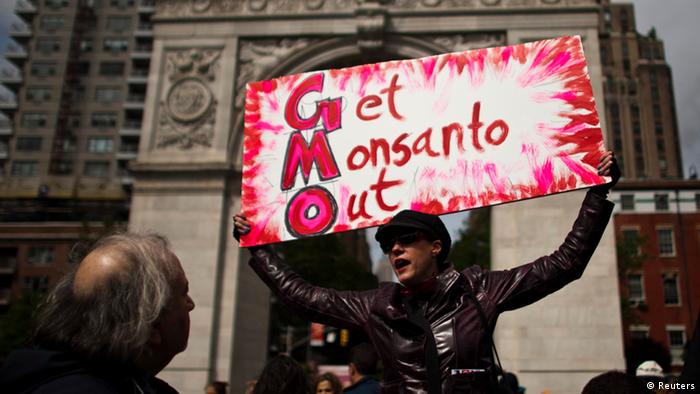
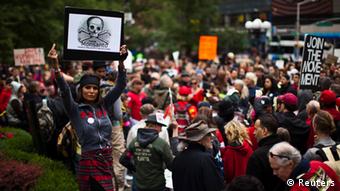
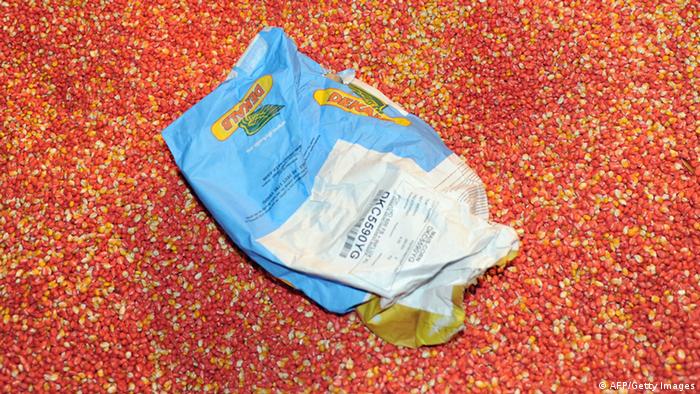





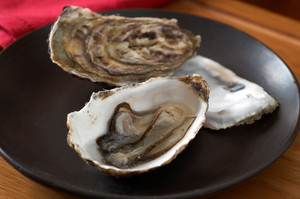

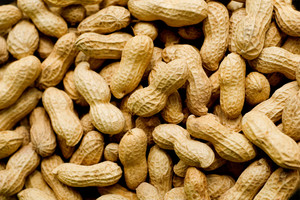








 根據國有的新華社的一篇報道﹐
根據國有的新華社的一篇報道﹐